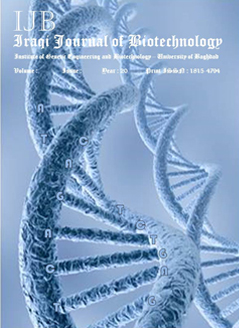
Twelve papers on the various disciplines of genetic engineering and techniques used in diagnosis were discussed in the opening article on the subject of epigenetics and its definition and the importance and the role played by modern biotechnologies in the advancement of science as a whole. It also dealt with successful methods in developing plans for future research. The first research concerned the development of effective antimicrobial agents through the extraction and characterization of actin from the bacterium Acinetobacter baumannii. The second research also dealt with the molecular typing of the bacterium of the Staph . aureus using one of the restricted enzymes ( RFLP-PCR )of the of the gene Coa . The fourth research dealt with the extraction and significance of the chemical reactions of Pseudomonas aerogenosa isolated from the soil, One research concerned the molecular detection of H-ras genetic mutation in people with bladder cancer in the a sample of Iraqi patients, other research deals with molecular detection of bacterial pathogens for urinary tract infections in children, and a study to investigate the detection of E. coli and rotavirus in children People with diarrhea less than than 5 years, Another research concerned the detection of the type of cytokines( IL-10) important and which have a role in acute and chronic heart disease, the tenth research dealt with the role of multiple genotypes and their relationship with diabetes mellitus( DMtype2) type II, research eleven dealt with the importance and relationship of detection of immunoglobulin type A in the saliva and the cycle of immunity and protection of mucous membranes Finally, one study examined the measurement of genetic diversity and the content of prolin in some types of wheat stock.

